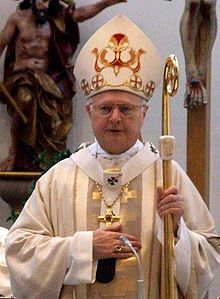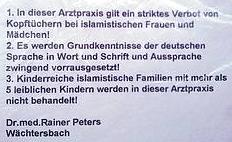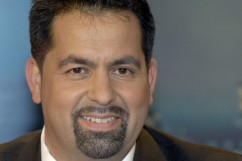Several Muslim centers in Berlin have been the target of arson attacks in recent months. Police have made little progress in their investigation, but many suspect that the series of incidents has its roots in the raw rhetoric surrounding Germany’s integration debate.
Category Archives: Germany
German government’s crackdown on non-violent Salafism
Germany’s stepped-up efforts to ban some Islamic groups for promoting radical views have sparked a national debate over whether the government is violating the free-speech protections of the constitution it says it is aiming to protect.
The German government’s latest move to crack down on groups that promote extremist Muslim teaching came earlier this month, as dozens of police raided homes, offices and religious schools in the western German cities of Bremen, Braunschweig and Mönchengladbach. The security forces were seeking evidence that could lead to the banning of two organizations that officials say are calling for imposing Islamic law in place of German law.
Interior ministry officials allege that the groups, called Invitation to Paradise and the Islamic Culture Center Bremen, seek to undermine Germany’s parliamentary democracy by supporting the establishment of an Islamic theocracy within the country. A security official said the groups also allegedly support a strict form of Islamic justice, such as the execution of Muslims who convert to other religions or the amputation of a hand as a punishment for theft.
Sven Lau, deputy chairman of Invitation to Paradise, rejected the allegations, saying that his group hadn’t done anything illegal and that it calls on its members living in Germany to abide by German law. He described the group as a peaceful fundamentalist organization that believes in a strict interpretation of Islamic law, but said it advises members who want to live by its more extreme forms to live in Muslim-governed countries.
The latest investigation marks a departure from previous crackdowns by German security and justice officials. German security officials are pursuing a ban of these two Islamic groups primarily because of the principles they espouse, rather than a suspicion of a link to terrorism.
Germany’s constitution, written after World War II and the fall of the Third Reich, makes allowances for restricting some forms of speech considered hostile to the country’s democratic order. German statutes, for instance, ban symbols such as Nazi swastikas as a violation of the constitution, and make Holocaust denial illegal. Until now, such laws have mainly been used to curtail neo-Nazi activism.
In announcing the raids, Germany’s Interior Ministry said “a democracy shouldn’t wait until faced with a violent form of holy war before it takes action against organizations that oppose the German constitution.”
Dieter Wiefelspütz, a member of Germany’s opposition Social Democratic Party and a parliament representative, said the Interior Ministry had the duty to investigate allegations that a group was teaching intolerance or hatred. “In Germany, the tendency is to close too few rather than too many organizations,” he said.
Call for racial and religious profiling at German airports
The incoming head of Germany’s main airport lobby group is demanding the nation’s transit authorities use racial profiling to weed out terrorists at security checks.
Christoph Blume, the head of Düsseldorf Airport, told daily Rheinische Post on Tuesday that air passengers should be divided into different risk categories, meaning they would be subject varying degrees of scrutiny by airport security.
“That way, the security system could become more effective to everyone’s benefit,” said Blume, who will take the helm of the ADV airport association next month. He said profiling passengers according to characteristics such as race, religion and country of origin would allow German airports to avert a further tightening of security.
While highly controversial because of its discriminatory nature, racial profiling has also found growing support in some quarters. However, critics fear it would stigmatize entire groups of passengers simply on their looks, faith or from where their trip originated.
German Catholic leader warns against anti-Muslim incitement
 The leader of Germany’s 26 million Catholics spoke out Tuesday in defence of Muslims and warned Christians to stay on their guard against hatemongers.
The leader of Germany’s 26 million Catholics spoke out Tuesday in defence of Muslims and warned Christians to stay on their guard against hatemongers.
Archbishop Robert Zollitsch, the head of the Catholic Bishops’ Conference, told the German Press Agency dpa that his church wants more dialogue with Muslims.
Asked if current anti-terrorist alerts might lead to discord between Christians and Muslims, he said “there has been no sign of it” as far as he can tell. “Christians as well as non-religious people in our country can differentiate perfectly well between terrorists, whatever ideology they follow, and their Muslim neighbours,” he said.
Zollitsch also noted that Muslims in Germany “are just as much endangered by the (terrorist) threat as everyone else”. “They have the same interest in effective and at the same time moderate policies by the state as the rest of the population,” he said.
Zollitsch said that a key to keeping relations between Christians and Muslims in Germany harmonious is “preventing political troublemakers from exploiting fears and from inciting people to hate one another”.
Germany applies anti-Nazi laws in crackdown on peaceful Salafi groups
German authorities hardened a crackdown on Islamic groups yesterday, raiding homes and schools that reportedly belong to adherents of fundamentalist Salafi Islam. German officials said the preemptive raids, conducted under German anti-Nazi laws of association, were aimed at uncovering unconstitutional or separatist acts and not part of an international terror hunt.
The raids targeted the Islamic Cultural Center of Bremen, on the North Sea, along with a group calling itself Invitation to Paradise in two small northwest German cities. Invitation to Paradise’s leader has called for sharia, or Islamic law, to prevail one day but has specifically opposed using violence to impose it.
While some experts say police overreacted in conducting the raids, German officials have come under great pressure from local media and citizen groups to respond to some Muslim organizations that appear to resist joining mainstream German society.
“These groups are a problem for integration, even maybe for radicalization, though not necessarily for violent jihad. They are very orthodox and like to be separate but are not preaching but usually condemning violence,” says Alexander Ritzmann, a former Berlin member of parliament now with the European Foundation for Democracy in Brussels. “The problem is that some jihadis in Germany from before identified themselves as Salafi.”
Christian Science Monitor, 15 December 2010
See also New York Times, 14 December 2011
Arson attack on Berlin Islamic centre is third incident in a fortnight
An Islamic centre in Berlin was hit by an arson attack on Thursday, with an assailant hurling a petrol bomb against the building’s facade. It was the third such incident involving a Muslim building in the capital in a fortnight.
The assailant threw a bottle filled with flammable liquid against the front of the cultural centre belonging to the Iranian community of Berlin and Brandenburg on Ordensmeisterstraße in the Tempelhof district, police said.
Greens MP Volker Beck held Chancellor Angela Merkel and Bavarian state premier Horst Seehofer indirectly responsible for the attack. This autumn Merkel declared that “multiculturalism has failed utterly” and Seehofer railed against Muslim immigrants – remarks widely seen as intensifying an already divisive debate over integration and Islam in Germany.
Residents alerted the fire department because an area of the building’s façade several metres wide was ablaze. Two people were in the centre at the time of the attack, but they were unharmed. The fire burnt itself out and left behind blackened brickwork. Police were investigating on the grounds of attempted arson.
Last month, similar attacks were launched against the Al Nur and Sehitlik mosques, both in the Berlin district of Neukölln. No one has so far been arrested.
Beck, who is the human rights spokesman for the parliamentary group of the environmentalist Greens, said Merkel’s comments and inflammatory remarks by Christian Social Union leader Seehofer had made sweeping judgements linking immigrants to people who refused to integrate and Islamists who opposed Germany’s constitution.
Former central banker Thilo Sarrazin, whose book “Abolishing Germany” kicked off the toxic immigration debate, as well as conservative politicians and even the populist Bild daily were pushing “an attempt at social division” that could “give impulse” to such attacks, he said.
See also “Berlin police probe spate of anti-Islam arson attacks”, AFP, 9 December 2010
Germans less tolerant of Islam than neighbours, study finds
Germans are more critical of Islam and less tolerant of building mosques than their neighbours in France, Denmark, the Netherlands and Portugal, a new survey has found.
Despite the other European countries’ often fractious relationships with their Muslim communities, people there were relatively positive about Islam and its followers compared to Germany, according to the survey commissioned by a research group based at the University of Münster.
According to weekly Die Zeit, which reported on an advance version of the study on Thursday, four out of 10 Germans in the former west of the country and 50 percent in the former east feel threatened by foreign cultures.
“Compared with the French, Dutch and Danish, a rigid and intolerant grasp of foreign religions predominates in Germany,” said the head of the project, sociologist Detlef Pollack. “The statement that Islam is part of Germany is completely disregarded in the opinions of Germans.”
The polling firm TNS Emnid, on behalf of the Münster researchers, surveyed 1,000 people each in the former west and former east Germany, France, Denmark, the Netherlands and Portugal. The study will be officially released later on Thursday in Berlin.
Fewer than 5 percent of Germans, compared with more than 20 percent of Danes, French and Dutch consider Islam to be a tolerant religion, according to the study.
Each of the other countries has had high-profile conflict with their Muslim communities – such as the Prophet Mohammed cartoons in Denmark, head scarf controversies in France and the murder of anti-Islam filmmaker Theo van Gogh in the Netherlands, as well as the rise of far-right politician Geert Wilders.
Nevertheless, a clear majority of people in those countries have a positive view of Muslims. By contrast, just 34 percent of western Germans and 26 percent of eastern Germans are positive about Muslims.
Most Germans saw barely any positive side to Islam, Pollack said. Less than 30 percent in the former west supported the building of mosques, while in the former east the figure was less than 20 percent. The acceptance of minarets or the adoption of Muslim holidays received even less support.
In Denmark, by comparison, more than half of respondents supported the building of mosques, while in France and the Netherlands the figure was about two-thirds and in Portugal it was nearly three quarters.
German doctor gets rap on knuckles over anti-Muslim surgery sign
 A German public health agency disciplined a doctor Thursday for hanging a sign in his surgery that demanded Muslim women remove their headscarves.
A German public health agency disciplined a doctor Thursday for hanging a sign in his surgery that demanded Muslim women remove their headscarves.
The sign made headlines in September, at the same time as a bestselling book was attacking German Muslims for their alleged unwillingness to adopt German ways and learn to speak German.
A demerit notice will be attached to the doctor’s name for the next five years in the German medical register, said Cornelia Kur, a spokeswoman for the agency that oversees medical practices in the Frankfurt region.
The penalty was one harsher than the mildest disciplinary measure. He was convicted of breaching his duty to treat all patients regardless of sex, age, origin or creed. Kur said the doctor from the small town of Waechtersbach escaped a tougher penalty, such as a fine or being struck off the register, because he took the sign down, met with a Muslim group and publicly apologized.
The “rules” sign in his waiting room had said head-scarves were banned, very large families were not welcome and all patients had to speak German. He said later he never seriously meant to turn any patients away.
German Muslim leader urges better protection of mosques
 A German Muslim leader on Saturday called for better protection of mosques across the country in the wake of the latest arson attack on Berlin’s largest mosque, IRNA office in Berlin reported.
A German Muslim leader on Saturday called for better protection of mosques across the country in the wake of the latest arson attack on Berlin’s largest mosque, IRNA office in Berlin reported.
Talking to reporters, the Chairman of the Central Council of Muslims Aiman Mazyek said, “Rarely does a week go by without an attack on a mosque.” “The current terror hysteria exacerbates this climate … and strengthens those people who plans such attacks,” he added.
Mazyek was referring to Friday’s arson attack on the Sehitlik mosque, the fourth of its kind on the worshipping house over the past six months.
The Muslim activist lambasted also Berlin’s interior senator, Ehrhart Koerting for suggesting that Arabs based in Germany were potential terror suspects. Mazyek urged Koerting to step up the protection of mosques in Berlin instead of making such ‘imprudent’ statements.
Last week, in connection with the current terror alert in Germany, Ehrhart Koerting advised Berlin residents to notify officials if they encountered new neighbours who were “strange-looking” or “only speak Arabic or another foreign language that we don’t understand”. As Die Welt observed: “Such neighbours certainly could not have been the terrorists behind the September 11 attacks. They were very Western in appearance and spoke good English or German.”
See also “Muslims victim of suspicion in Germany, says leader”, DPA, 20 November 2010
Arson attack on Berlin mosque
A fire at Berlin’s largest mosque was probably arson, police said Friday. The fire, which was spotted in the early hours by an employee of the Sehitlik mosque, damaged the facade and one window. Nobody was injured.
Police said their investigations were focusing on an unexploded bottle of propane gas, found by the building. They think the bottle was transported to the mosque in a black rucksack, on a pushcart.
The employee who spotted the fire, at 6:15am (0515 GMT), was able to extinguish it.
The Sehitlik mosque is in the inner-city Berlin district of Neukoelln where many Muslims live. It has room for 1,500 people.
